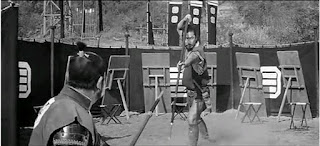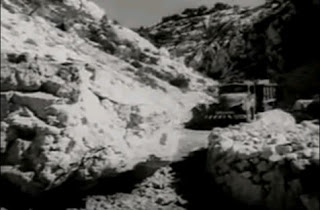卑賤的蒼生, 被命運玩弄於股掌中。- E. L.
Life is a game, and this is in no way a cliché. The ups and downs in every moment of your existence, the stress to achieve and, the burden to survive, these aspects can almost keep you ‘on the edge’. The loosening of a cork screw, or the appearance of a mindless error, will lead you to hit the wall in the ‘game of life’. The big question is, just when is your turn to be eliminated, by destiny? Such is the theme of H. G. Clouzot’s masterpiece ‘The Wages of Fear’, which was released in 1953. It was the film that has made Hitchcock to realize that he had a serious rival. It can be one of the most suspenseful films ever in the history of cinema (almost 90 minutes of non-stop suspense), and the bleakness of the film is rare, especially for nowadays’ popcorn movies. The film was released in the Eisenhower era, which conformity was seen as the norm. Given the amount of ‘feel-good’ movies released at that era, I suppose ‘The Wages of Fear’ would be considered as ‘intense’ for many viewers at that time (and of course the anti-American parts were cut in the USA release). The film won major awards at the Cannes festival, and has inspired at least 2 re-makes ever since. ‘The Wages of Fear’ has achieved a timelessness that has not dated.

Why is 'The Wages of Fear' my favorite European film?
When I first watched ‘The Wages of Fear’ at my teenage years, I was of coursed impressed by the excitement and pleasure (!!) of watching this sweaty quartet, transporting explosives on trucks through the narrowing mountain passages. To me, the film was a first-rate thriller that could captivate audience who enjoyed adventure movies. When I grow up, and have been able to read more and gain more life experience, I start to be able to appreciate the point for Clouzot to make this masterpiece.
‘The Wages of Fear’ is the allegory of life. Through an existentialist perspective, Clouzot philosophized the futility of an almost insurmountable aim, and the absurdity of the human condition. To me, all the key barriers the 4 men had to pass through possessed rich and insightful philosophical meanings, and that will be the subject of my second article. Clouzot challenged his viewers to be courageous, and to stand up to the absurd moments of life. Through the waves of challenges in our human existence, we desperately hold on and try not to fall off. Just when we think we have turned around a corner, another barrage of obstacles lead themselves up. Too often, even a smallest error can lead to a catastrophic consequence. And, the baggage we are carrying are not getting lighter as our journey continues. Call me pessimistic, yet this is the harsh reality of life. Any authentic person will be able to accept the absurdity and stop asking ‘Why?Why?Why?’. All you need is the
courage to continue, and the will to ‘getting through hell’. It is the
‘suspenseful’ nature of life that makes life so endearing. In 'The Wages of Fear', we are not encountering perverse monsters or other-worldly species, we are battling against the Force of Nature and also our fate. None of the characters are perverse, yet they all have their dark sides to confront, or to come to terms with. It is the balance of realism and 'The Absurd' that makes the film so fascinating. By telling us these ugly, yet insightful truths, I am convinced that Clouzot is an admirable filmmaker, and the dark and gritty film is shining inspiring perspectives for generations of audience.
‘We don’t need your life story.’
(SPOILERS! t is important here as it will definitely diminish the potential thrill and excitement you can get from this masterpiece.)
*****SPOILERS START*****
In order to survive, how far can you get to? You've better asked this question to the hopeless residents in Las Piedras, the fictional South American town in 'The Wages of Fear'. With their soulless existence, the 'odd man out' seemed to be the Southern Oil Company, an oil enterprise known for exploiting the workers in the town. There was a small airport to prevent this town from being a lonely island, too - yet do you think anyone will have the cash to get an air ticket, spread their wings and fly away? Among these desperate people were Mario, a Corsican playboy; Jo, a bully and ex-mobster from France; Bimba and Luigi, 2 other immigrants. Finally, a chance came for the underdogs. A massive fire happened at an oil field, and, absurd as it might seem, the only logical way to deal with this saga was to use nitroglycerine, an explosive chemical, to cause a big explosion, thereby consuming the oxygen source and capping the well. But no one is ready for this farce, right? So, without proper equipment, and with the town separated from the oil field through miles of mountain roads, the company decided that the explosive nitroglycerine had to be transported there anyway, with some second-rate jerrycans, on 2 trucks respectively. What does that mean? Well, that means
the unstable nitroglycerine can explode with the lightest perturbation from the truck, and an explosion may just happen for absolutely no reason! It sounded dangerous, and of course the company knew it, so they were not willing to risk legal challenges from the unionized workers. Then who would do it? The desperados, of course! The company decided to recruit 4 men, and each would be paid for US$2000, if they could survive and come back. Honestly, this is not much, but this is more than enough to get an air ticket and escape the doomed hell in this small town. So, a lot of volunteers applied for this 'suicidal mission'. Eventually, Mario, Bimba, and Luigi were employed, and another German. Yet, the German never turned up, and Jo was substituted, leading to the suspicion that Jo might have killed him to take the job.
 |
| An iconic image from the film. |
So, the trucks set out and began the suspenseful journey. Bimba and Luigi was on the first truck, followed by Mario and Jo in the second truck, within a reasonable distance to limit the possibility of collison or casualties. Yet the aggressive Mario and Jo drove a bit too fast, and also crashed into Bimba and Luigi's truck. Later, they had to cross a rough stretch of road, and also a rotten wooden platform. After these physical challenges, they came across a giant boulder blocking the way. The 'Old Jo', unlike the tough guy persona he has always been showing in town, started to be consumed by the stress and freaked himself out like a coward. They eventually solved the problem by doing a controlled explosion on the rock, after a tense preparation stage.
 |
| Explosion of the first truck. |
Soon after the height of their achievement, the first truck
exploded, and Bimba and Luigi perished for
absolutely no reason. They were eliminated - from the game of life. Seeing this, Mario and Jo realized they were getting closer to their doom. The explosion caused an extra obstacle for Mario and Jo, too - a large pool of viscous oil which blocked the way. Their truck was unfortunately stuck, and any instability could perturb the nitroglycerine to explode. Jo stepped down to the oil and helped to navigate, yet when desperately trying to free from the oil's clutch, Mario's truck ran over Jo and mortally wound him in the process. Eventually, the truck could continue, yet Jo was dying. They reached the destination, and the explosives successfully put out the fire. Mario was given the reward, and he drove the now empty truck back to the town.
Happy ending? No, I haven't finished yet...
An elated Mario drove through the narrow mountain passages, knowing that now there were no explosives to burn him to hell. As he was proudly testing his driving skills, he made a careless turn, and lost control of the truck. As the truck fell down the mountain, Mario finally lost control of his life, and plunged to his death...
 |
| THE END. Literally. |
*****Spoilers end*****
I have always been a strong believer for the following wise opinion - t
he truest side of the human nature will only emerge from the most extreme of situations. In The Wages of Fear, this is exactly what that means. The wisdom of the statement derives from the 'theatrical nature' of human relationships. We are all actors of our lives. We put on masks and facades, to present ourselves to the others in a way we desire. The motivation can be self-interest or empowerment. Yet when the challenges come, will you still be the same? Look at smart old Jo. He's a bully, harassing other people to prove himself strong all the time. He is smart indeed, as he knows how to get the power. But when flying rocks and furious explosives are marching towards him, he reduces to nothing more than a chicken.
It is the extreme scenario that rips off his deceptive mask and reveals his true nature, and these are the cases that count.
The Wages of Fear is in no way a popcorn movie! While it looks like an adventure film, it is more fair to categorize it as a Film Noir. You may disagree - because unlike the claustrophobic environment in many of the Noir, 'The Wages of Fear' takes place at the exterior. Yet, it is the atmosphere and the paranoia that makes the film a Film Noir. The film captures the paranoid atmosphere evident in a number of films from the 1950s, such as 'Rififi', 'Le Trou', 'Touch of Evil', to name a few. The suspense, amoral characters, and the fatalistic bleakness also contributes to the Noir outlook of the film. And, sitting in a tiny component in the truck, with a burden of explosives at your back, is honestly the most claustrophobic experience I can imagine!

What is your motivation of life? For many, it is merely to 'get more'. Survival, in a sense, is about getting the best for oneself. At the opening minutes of 'The Wages of Fear', a kid was seen torturing some insects aimlessly on the muddy ground, which an ice-cream cart drove by. He had no money to get the ice-cream he wanted, and could just stare at the cart. Soon, the ice cream cart departed. This is a meticulous foreshadowing sequence by Clouzot, as it illustrates the underlying theme of the film. This sequence has clearly inspired the opening scene of Peckinpah's 'The Wild Bunch', as both sequences succinctly establish the bleak outlook of the directors. We desire and fight hard for whatever we want in our existence. When the chance has expired, it walks by. The hope for the child may have vaporized, but his desire has not. The question is, what is one willing to lose to get it eventually? In the case of our 4 protagonists, are they willing to struggle hard for the ultimate reward, even if that means they will reach their demises? Bleak as it may seem, it is the 'wage' you get for getting through the thrill of life.
One learns more as the journey continues. If that is the case, then 'The Wages of Fear' is a hell of an educational journey!
(1/2)
by Ed Law
5/9/2015
Film Analysis - 55


























































